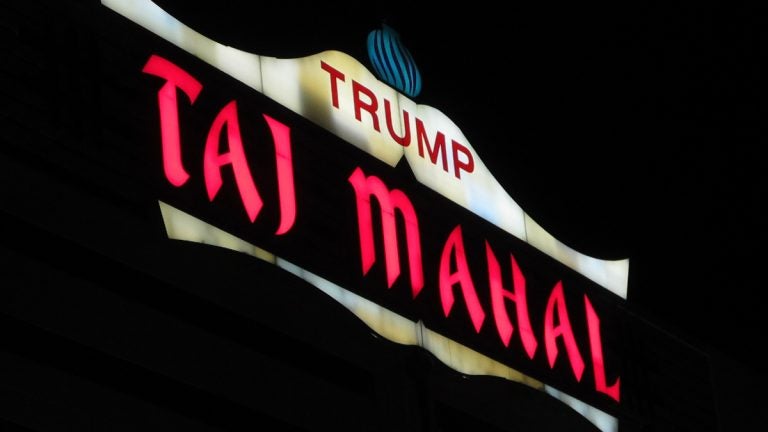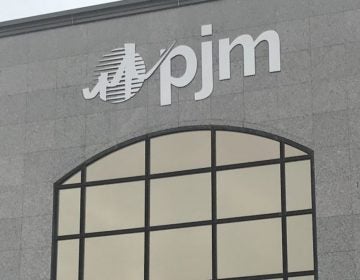How the Atlantic City rescue plan is supposed to work

(AP Photo/Wayne Parry)
The legislative debate over Atlantic City’s financial struggles — and the future of gambling in New Jersey — is starting to shape up as a deadline approaches for what could be the city’s fifth casino closure of the year, and lawmakers look forward to passing bills on casino taxation, redevelopment funding, and local tax relief as soon as next month.
Senate Majority Leader Stephen Sweeney (D-Gloucester) this week introduced a package of five bills, one of which would attempt to address the city’s “fiscal nightmare” by stabilizing its collapsing tax base.
Linking casino taxes to profits not property
Under a new PILOT program, casinos would pay $150 million for two years, compared to the current total casino property tax levy of $210 million, and future payments would be based on their gambling revenues rather than their property valuations, which have been falling as casinos challenge their tax assessments in court.
“Atlantic City will be able to depend on a certain level of revenue from casino gaming properties each year, making the local property tax rate and need for state aid less volatile,” the bill reads. A PILOT will “help to stabilize the casino business models and the workforce required to run those business models, and the casino gaming properties will be better able to compete with out-of-state casino gaming properties in the region.”
One of the bills would also redirect $25 million to $30 million that casinos pay to the Investment Alternative Tax (IAT) collections to cover municipal debt payments. Currently the state’s Casino Reinvestment Development Authority spends that money on projects in Atlantic City. But the city desperately needs financial help, as it has taken on $345 million in debt since 2010 to pay casino tax refunds and raised the property tax rate 53 percent in two years.
After the hearing Mazzeo said he would like to see Sweeney’s bills taken up early in the new year; Sweeney has said it could happen in January. Mazzeo said he was optimistic the Legislature would support the bill redirecting IAT taxes to the city’s debt service, but said passing the PILOT program should require casinos to pay more than currently proposed.
Making up for the tax cut
Atlantic City’s total tax levy this year is $377 million. Sweeney’s plan calls for local taxes and tax equivalents next year to total just $305 million because in addition to the $150 million from the PILOT, casinos would be responsible for $25 million to cover city debt and $130 million in property taxes. This would leave Atlantic City short $72 million. The plan calls for the city and schools to make budget cuts to help make up the difference.
“Those numbers are going to have to be worked out a little bit better to make sure that it’s fair across the board, so the city gets the right amount of money and they can anticipate that every year,” Mazzeo said.
Mazzeo pointed out that casinos are paying $210 million in property taxes this year and said the PILOT should be closer to that amount. He noted that another of Sweeney’s bills would end casinos’ $30 million annual contribution to the Atlantic City Alliance, a three-year-old tourism-marketing organization, freeing up funds that could go to the PILOT instead.
“It has to be a little bit higher. Perhaps start at $170 million — that would be my recommendation,” he said.
Mazzeo said the PILOT program will also have to be carefully calibrated to ensure the casinos’ obligations are fair. Under the current proposal some would effectively pay less in property taxes while others would see a slight increase, he said.
Casino taxes could go lower
Sweeney’s legislation creates a council of casino operators to determine how much each must pay, taking into account their relative physical size, number of hotel rooms, and gambling revenues. The combined PILOT would be $150 million in the first year and, barring a steep fall in gaming revenues, roughly the same amount in the second year.
For the following 13 years, if gaming revenue remains between $2.2 billion and $2.6 billion a year, the PILOT would drop to $120 million a year. Revenues under $2.2 billion would result in a $110 million PILOT; under $1.8 billion, $90 million; and under $1.4 billion, $75 million.
In the unlikely event that gambling revenues reverse their long decline, earnings over $2.6 billion would raise the PILOT to $130 million; over $3 billion, to $150 million; and $3.4 billion to $3.8 billion, to $165 million. The bill does not set a PILOT for gaming revenues above $3.8 billion.
In addition to sending money to the city through the PILOT and IAT bills, Sweeney would create a new category of state aid specifically for the Atlantic City School District. It would receive “commercial valuation stabilization aid” because the value of its taxable commercial properties declined nearly 32 percent, from $16 billion to under $11 billion, between 2008 and 2013, according to the bill.
While the amount of aid would be determined by the state’s education commissioner, the bill specifies that in the first year it must be used to reduce the district’s tax levy.
Although Atlantic City has a high poverty level, its schools have not qualified for state equalization aid for poor Abbott districts because casinos have provided ample property tax revenues. The bill essentially aims to designate the city as a poor district eligible for aid.
Atlantic City could lose another casinoAt the same time, officials are waiting to see if bankrupt Trump Entertainment goes ahead with a plan to close the Trump Taj Mahal casino, December, 20, 2014., putting another 3,000 people out of work and removing yet another major taxpayer from the rolls. The casino closed one of its hotel towers Tuesday.
Trump Entertainment has said it will keep the casino open if Local 54 of the Unite-HERE drops its appeal of a court order that canceled the union’s contract, ending workers’ health coverage and pension payments. Trump has offered to restore health benefits for two years and contribute to a new pension plan.
“The negotiations are still in full force, and hopefully they’ll come up with some sort of agreement there to get those people back to work,” Assemblyman Vince Mazzeo (D-Northfield) said yesterday.
One of Sweeney’s five bills addresses the Taj Mahal situation by requiring casinos to provide employees with health and retirement benefits or risk losing their licenses to operate.
North Jersey vs. South Jersey
Mazzeo and other legislators discussed Atlantic City and the prospects for expanded gambling in New Jersey at a hearing of the Assembly’s tourism and gaming committee Thursday morning. The hearing was cut short after Mayor Don Guardian failed to show up to answer questions as expected, drawing expressions of disappointment from the committee chair, Assemblyman Ralph Caputo (D-Essex).
Caputo said he wanted to ask Guardian about Atlantic City’s fiscal plight and his thoughts on expanding casino gambling to northern New Jersey in order to recapture gamblers who now visit newer casinos in New York. Caputo, a former casino executive, has proposed authorizing an expansion via a voter-approved constitutional amendment, but Guardian opposes such a change, as does Mazzeo and Assemblyman Chris Brown (R-Atlantic).
Brown and Caputo had a testy exchange during the hearing, with Brown saying that 42 percent of Atlantic City’s gamblers come from north Jersey and putting casinos there would “cannibalize” the city. Caputo responded that the state had already invested heavily in Atlantic City, in part by backing the failed Revel casino, and said Brown had not come up with any solutions to address the decline of gambling.
“When you look at those casinos, those buildings, on the boardwalk, and you see them closing one after another, doesn’t that bother you? You want to blame somebody for that?” Caputo said.
WHYY is your source for fact-based, in-depth journalism and information. As a nonprofit organization, we rely on financial support from readers like you. Please give today.




